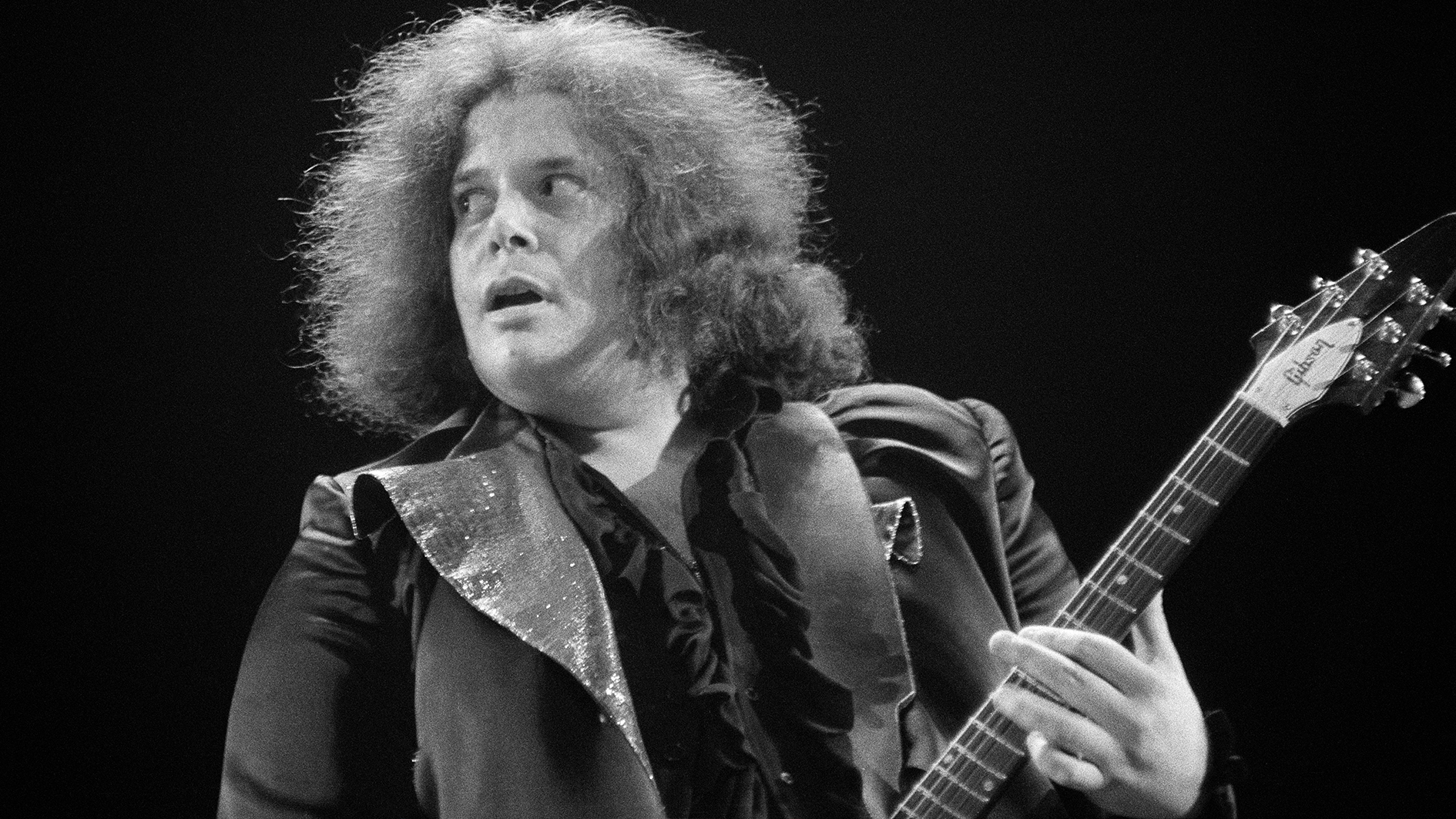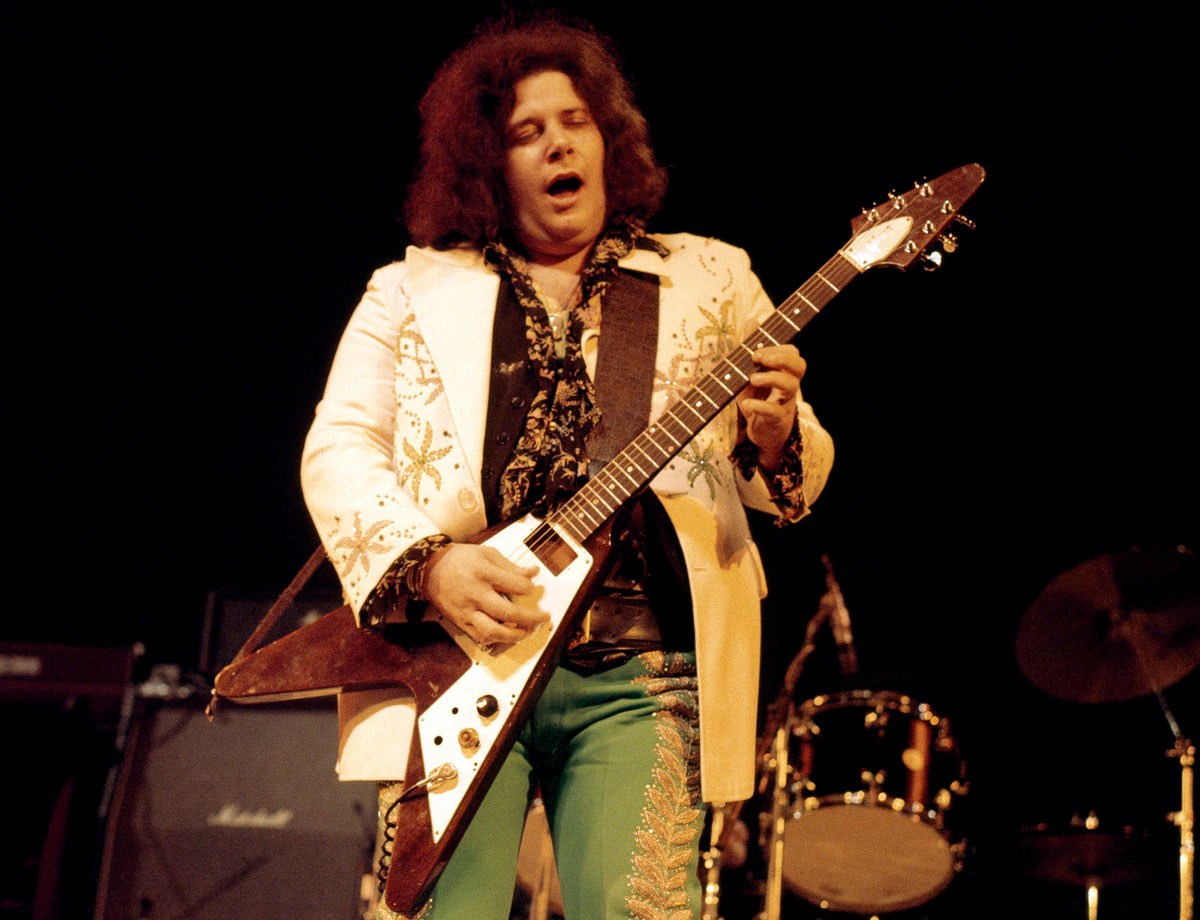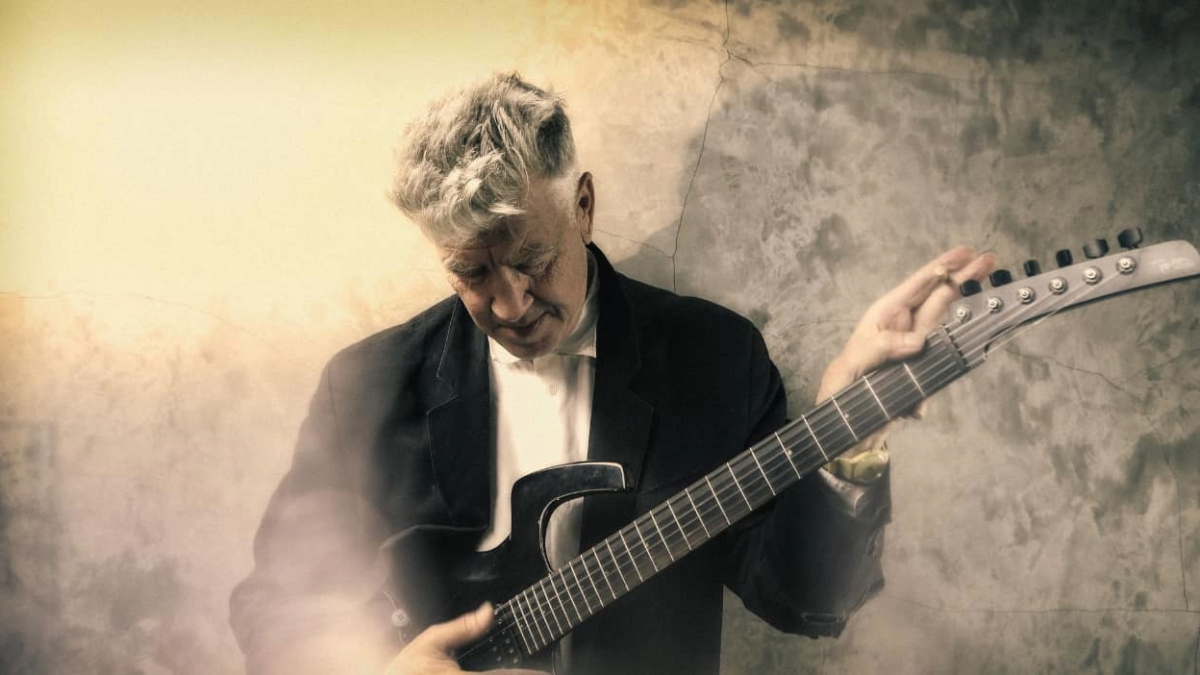Leslie West talks jamming with Jimi Hendrix and seeing Eddie Van Halen for the first time in this classic 1987 Guitar World interview
The trailblazing Mountain guitarist discusses life on the road in one of the heaviest hard-rock outfits of the time

This interview with Leslie West is from the January 1987 issue of Guitar World, which featured Yngwie Malmsteen on the cover. The original story by Gene Santoro started on page 22 and appeared with the headline, “Leslie West: A Sleeping Giant Comes Alive.”
“You can't get more basic and efficient than this,” croaks Leslie West as he gestures at his brand-new Les Paul Junior. Gibson has given him the first of their re-issued line, in honor of all he did for that model by playing it to death-his earlier ones literally fell apart from use – in Mountain and West, Bruce & Laing.
“It's just a hunk of wood with one pickup and a tone control – ya gotta have a tone control to get that bassier sound Clapton calls The Woman Tone – but that's all you need.”
Kinda like the axman's style itself, his guitar. At the beginnings of the hard rock era, West opted for a leaner approach that combines that fat-beyond-fat distortion, a blues-derived vibrato and a pentatonic sense of melody that could make his solos sing even while they rock-and-raunched.
“I'm no great guitarist technically,” he shrugs. “I only play with these two fingers [index and ring]. But you wanna know why people remember me? If you take a hundred players and put them in a room, 98 or 99 of 'em are gonna sound the same; the one who plays different, has some of his own, that's the one you're gonna remember.”
In Leslie's case that memory reaches back a long way, to a place called Long Island in the early '60s.
“Why'd I pick up the guitar? To get laid,” he laughs. “When? I'll tell you when. My uncle used to write for Jackie Gleason, and my grandmother used to take me to all the tapings. So one summer she took me to see Jackie Gleason's American Scene Magazine, but there was a replacement – Tommy Dorsey and Jimmy Dorsey had the stage show instead.
All the latest guitar news, interviews, lessons, reviews, deals and more, direct to your inbox!
“I started crying 'cause I wasn't gonna see Gleason – he was my hero, with the carnation and the sharp suits, the whole bit. But you know who was the guest on the show? Elvis Presley.
“That's when I started playing guitar – saw that son of a bitch come out and go [mimics Elvis], 'Well it's one for the money,' and thought, 'I gotta play this thing.'”
Why'd I pick up the guitar? To get laid!
After a couple of ukulele lessons from a cousin studying at Juilliard, West got the ax to play: “A '58 sunburst Strat – I got it with my bar mitzvah money [laughs].” He went right to the sources to learn how to play it, copping licks off records by his favorites: “B.B. King, Albert King, Eric Clapton, man.” Then in 1964 came the Vagrants, a local band formed by West and his bass-playing brother, which built quite a New York-area rep.
“You know what happened with that Strat?” he grins. “When the Vagrants started we all wanted new guitars, so I traded it in for – get this – a Kent, a red Kent with three pickups – it was disgusting, man.”
Equally disgusting were some of the toilet-sized clubs the Vagrants played, though they managed to put out one sorta-semi-local-hit single, a four-piece rock cover of Otis Redding's Respect.
“Our manager was greedy,” is how he tells it, “and he put out the B-side of Respect as a single because he had the publishing rights on it. Then Aretha cut Respect and Jerry Wexler put hers out and it was a hit.”

That became one of the last in a series of setbacks that finally fractured the group: “We'd done two singles with Felix Pappalardi, and we were gonna do an album at the time when Wheels Of Fire [the second Cream LP Pappalardi had produced] was Number One.
He had two weeks to produce an album for us, and we had no songs; so [laughs] we tried to write some. That's when we broke up. We couldn't record, man; we just couldn't get on tape what we were live.”
Back to the drawing board, and on with the beginnings of a new group: “I'd put Mountain together with an organ player who played bass pedals and a drummer, and called Felix immediately – he'd told me to call him as soon as I had anything going. This was after he did Goodbye by Cream. So I played him some of the stuff: yeah, great, went into the studio with these two guys.
To make up for my lack of speed I added in a lot of vibrato from the blues guys like a chef adding ingredients to a stew
“Well, the drummer wasn't good enough; he threw us out of the studio again [laughs]. So Bud Prager, my manager at the time, said, 'You can't throw Leslie out again – he'll kill himself.' I mean, I'd practiced my ass off for this session.
“So I conned Felix into playing bass, and that's how we did my album. How'd I con him? I said, 'There's never been a fat and a skinny guy onstage; we can't miss.' I was terrified, but he bought it hook, line and sinker. That's how it all started.”
“It” being the real Mountain, of course, whose short lifespan (1969-73) produced one of the raunchiest tracks ever to clock in at Number One, Mississippi Queen.
That cut, as well as their albums, helped define the riff-based harder rock emerging at the time-a trend that would evolve into heavy metal. West himself sees his role in that transition with typically good-natured candor.
“I just took over where Clapton left off when he quit. To make up for my lack of speed I added in a lot of vibrato from the blues guys like a chef adding ingredients to a stew, you know -- and worked on my squeals and pig grunts,” he laughs, referring to the octave-harmonic scream he used to stab home many a riff and solo.
“You gotta have the Junior to do 'em right, because of the single pickup – see the way the string can bend down when you hit 'em? If there was a neck pickup it'd be in the way. You bury the pick with your thumb and you have all the room you need.
“And the tone – well, it was fat just like me, right? It was just two Sunn stacks with the Colosseum PA heads. They were Hendrix' old amps, re-tolexed and re-coned. See, the PA heads had those four inputs and a master volume, which started the distortion thing for me: I'd turn the mic volume all the way up and the master all the way up, and overdrive the thing like crazy.”
After a debut gig at the Fillmore East – not a bad venue for a band nobody had seen before – he got to overdrive the thing at one of the biggest gigs ever.
“Woodstock was 17 years ago now – can you believe that?” he muses. “Man, I was so nervous that night. I remember getting in the helicopter – we had to rent our own helicopter to get up there, with the traffic and all – and the helicopter pilot was a wise guy, man; said he wouldn't take all of us at once 'cause I was too heavy [laughs].
“We were getting five grand for it, which was incredible money for your third gig in '69. Our agent was Hendrix' agent too, Ron Terry; they were hiding Hendrix at Woodstock because whoever was seen went on. They told me to hide, and naturally I found where the bagels were – they had bagels, believe it or not, except that Janis Joplin ate 'em all, so there were none left [laughs].
Hendrix wound up closing the show and there was nobody there – it was a damn shame, 'cause he played great
“Anyway, they grabbed us and we went on; Hendrix wound up closing the show and there was nobody there – it was a damn shame, 'cause he played great."
As West got to observe close up on occasion: “I played with him the night before he died. We met at a club called Ungano's, then jumped into his limousine, went to Mountain's loft, got some Marshalls, came back to Ungano's and played until three in the morning.
“He played bass, and this idiot from the East Village Other [an underground newspaper of the time] who reviewed the thing complained that I played louder than Hendrix – he didn't even see Hendrix was playing bass.
“Next day, I went to Detroit, he went to England; pulled into the Sheraton Cadillac in Detroit and the lady there said, 'Another one of you longhaired freaks kicked the bucket, black guy.' Felix and I looked at each other and knew who it was.
“Y'know, Jimi was working on Band Of Gypsys at the Record Plant when we were finishing Mountain Climbing!, and he was the first guy to hear it mixed. There's a little stop in the beginning of the lick for that tune, like a horn thing, that he really liked.
“I've thought about it sometimes: with all the locking nuts and tremolo bars now, I don't think he'd be sounding good with 'em, 'cause his whole thing was stretching the damn strings back into tune.”
For the two-and-a-half years or so after Jimi's death, Mountain burned up road and studio alike, until bassist/producer Pappalardi pulled a move of his own. “He told everyone he was deaf,” is how West tells it, “and that he had to go into the hospital, but it was for drug withdrawal, really.
“So he wasn't able to go on the road any more and Corky and I weren't gonna stop; it came down to 'Who am I gonna ask?' I had two choices: I was gonna ask Joe Cocker for a bass player and a keyboard player, or else ask Jack Bruce and have one guy who could do the whole trip. He was the greatest, man.
“I mean, I idolized Cream, and here was a chance to play with one of the best musicians in rock 'n' roll. And one of the best writers, too: Theme From An Imaginary Western is a great song. I'd love to have us do it again and put it out now, as a single, 'cause Mountain never did and should've.
“You know what it's about Cream going on the road. 'When the wagons leave the city / The sun is in their eyes' – it's all about stardom and the fights and everything. Jack had it written in Cream but Clapton didn't want to do it, said it was too complicated. Now, it's not a regular blues progression, there are a lot of changes in it, but it changed my life.
“Why? Because I found out I could use a relative-minor scale over the changes; it's in the key of A, but when it came time for the solo I went to F-sharp minor and pretended I was playing blues. That's why it sounds so sweet, it's almost like country.”
Life on the endless road grind was not so sweet, however, and claimed West as a casualty. “I've done 17 albums and I don't know how many tours now,” he declares, “between Mountain, West, Bruce & Laing, and myself, but all the stuff with Mountain and West, Bruce & Laing was done over such a short time – four years, man. It seemed like a helluva lot longer than that.
Neal Schon said to me, 'Leslie, you gotta check out this kid who's opening for us; he plays guitar like an organ,' and it was Eddie Van Halen
“We worked about 285 jobs a year, one-nighters; it was killin' man, really stupid. I didn't enjoy myself, got too concerned with being famous – and got into drugs."
And so it was that he found himself in Milwaukee in 1977, shedding the heavy junk habit he'd developed and about to change his musical life via a chance contact.
“I'd stopped playing, didn't even want any guitars around,” he says. “But while I was there I went to see two shows. One was because Neal Schon said to me, 'Leslie, you gotta check out this kid who's opening for us; he plays guitar like an organ, like a Bach organ fugue.
“I was totally taken aback – it was Eddie Van Halen, and he impressed me the way Clapton impressed me. And then the next night I went to see Sammy Hagar. What a co-inky-dink, eh?"
That coincidence brings us up to the present, where it has extended to find West opening for the second leg of Van Halen's current tour. Besides co-writing two songs with the young whammy master – one of them a moving description of life behind bars over a hooky and hard-rock riff, whose lyrics were penned by a group of prisoners – Mr. Mountain has been having a blast offstage as well as on.
"Alfonso Johnson, Carlos Santana, Eddie and me were playing in a hotel room one night for an hour-and-a-half without stopping at all. Man, I had the time of my life with those guys. And I've learned how to write by myself, too; I spent two years, '77-'79, working hard with Corky Laing in that, and he was a terrific help."
Whatever else may have changed, though, his approach to his ax remains pretty much the same as ever: “Felix used to tell me, 'Don't think, just play.' You know, most guys when they pick up a guitar, if they play lead they start playing leads right away.
“I learned that you should think about the song, think about the chords you're playing behind, and so most of my solos come right out of those chords. You play the notes within the chords and try to pick a melody from there. For a solo I'll have a theme in my head to start, 'cause it's like Keith Moon said: 'Your entrance and your exit should be devastating, and everything in the middle is filler.'”
You can hear that fierce attack at work as he plays through the photo shoot at the Collector's Choice studio. West's reissued Junior played through Peden's vintage amps sends scraps of tunes spinning past in that creamy thick tone and wide, warm vibrato: Beat It, Mississippi Queen, Crossroads, I Feel Fine, Outside Woman Blues, Foxy Lady, The Wind Cries Mary, various squalling, screaming blues from the string-bending school of Albert King.
His eyes close, his mouth works in mime to the raunch erupting from his amp, he sways his bulk gently – and Leslie West is back.



